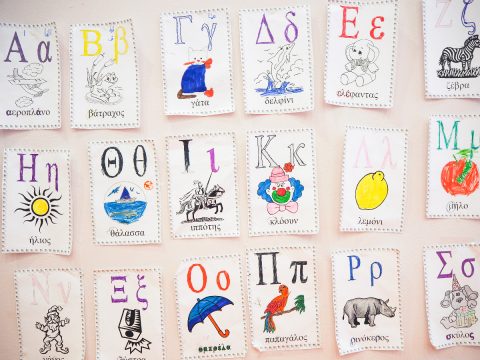Finn Church Aid helps refugees study in Greece – ”Studying gives faith in the future”
Because of war and having to flee their home, many refugee children have spent years without education. For many of them, learning centres aided by Finn Church Aid are the only chance to get to study in Greece.
Once in the corridor, children’s voices can be heard. It is impossible to make out the language, but the volume rises in the tiny hall behind a door on the top floor. Children are running around, and mothers are seated on the sidelines, waiting for their turn to talk to social worker Stella Paziou.
Monday is always a busy day for Paziou, as it is the day when new pupils are registered in the Athens-based Satovriandou learning centre. For many refugees and immigrants having arrived in Greece, places such as this centre are the only chance to get to learn, since integrating refugees into the Greek school system is still a work in progress.
It is Paziou’s job to learn about the children’s schooling history, and if necessary, to tell parents where they can find the services they need. She then directs the new pupils to a suitable group in which they begin to study Greek, English, and skills necessary to survive in the new country.
”The children may have a gap of several years in their studies, as they have travelled a long way to Greece, and many may have had to drop out of school while still in their home country because of war,” says Paziou.
The youngest in the centre, around three years old, attend the centre’s kindergarten. The oldest are on the verge of adulthood, and the centre also organises language courses for the pupils’ parents.
Over the course of a day, up to more than 100 children and young people visit the centre.
Language barrier has to be crossed every day
Finn Church Aid aids education of refugee children and young people in Greece
- More than 3,100 or about 15 percent of young refugees living in Greece have had the chance to study in Greece thanks to the work of Finn Church Aid.
- Finn Church Aid has aided its Greek partner organisations, Apostoli and Elix, e.g. by drawing up curricula for refugees and by training teachers.
”Fráoula”, says Tseliou in Greek, pointing at a picture of a strawberry.
”Al-Farawila”, repeats the assistant teacher in Arabic.
Teaching is challenging, as new pupils join the groups every week. Every time, the work begins from scratch; the teachers need to figure out what level the child is on and explain what schoolwork is about.
”In an ordinary school, education is directed at different ability levels, but here every child is on his or her own level. Some of the children don’t know any Greek words, or they may know words such as water that they needed at refugee camps in the Greek archipelago,” says Tseliou.
In the kindergarten, a snack is being served, and hummus-and-cucumber sandwiches disappear fast from a cardboard box. Kindergarten teacher Dimitra Kanata strokes the head of a little girl who has stopped to hug her leg.
”Every day, we need to figure out ways to cross the language barrier, although we try to do as much as we can in Greek. We read stories and do craft projects based on them, the last thing we did was draw an ocean with fish in it,” says Kanata.

At Satovriandou learning centre, pupils are taught the basics of Greek, English, and their own native language. Photo: Noora Jussila / Finn Church Aid.
Finn Church Aid helps draw up curricula
Even though the Greek aid organisation Apostoli maintaining the centre has been carrying out aid work for a long time, the workers had no previous experience of working with refugees and immigrants. So, Finn Church Aid was called in to help.
”No child should be left without an education. Finn Church Aid has experience of education projects and working with people from different cultural backgrounds, and this collaboration has been a great help in drawing up curricula, for example. In addition, the volunteer from the Teachers Without Borders network has been a great help for our teachers, many of whom are newly graduated,” says Apostoli director of programmes Vassi Leontari.
The aim is to teach the pupils at Satovriandou centre enough Greek for them to study in a Greek school, or enough English for them to manage in other parts of Europe.
”We can see a clear change in the children once they get to study. Studying gives them faith in the future,” says Leontari.
Text and photos: Noora Jussila
The project is implemented in cooperation with UNICEF and supported by ECHO and Church of Sweden.